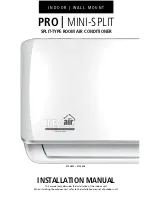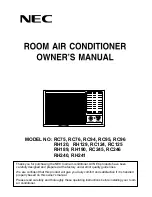
24
Safety Precautions
WARNING
This appliance is
fi
lled with R32
(mild
fl
ammable refrigerant).
If the refrigerant is leaked and exposed to
an external ignition source, there is a risk
of
fi
re.
Indoor unit and outdoor unit
The appliance shall be installed, and/or
operated in a room with
fl
oor area larger than
A
min
(m²) and keep away from ignition sources,
such as heat/sparks/open
fl
ame or hazardous
areas such as gas appliances, gas cooking,
reticulated gas supply systems or electric
cooking appliances, etc. (Refer to Table A of
Installation instructions table for
A
min
(m²))
Be aware that refrigerant may not contain an
odour, highly recommended to ensure suitable
fl
ammable refrigerant gas detectors are
present, operating and able to warn of a leak.
Keep any required ventilation openings clear of
obstruction.
Do not pierce or burn as the appliance is
pressurized. Do not expose the appliance to
heat,
fl
ame, sparks, or other sources of ignition.
Else it may explode and cause injury or death.
Precaution for using R32 refrigerant
The basic installation work procedures are the same as
conventional refrigerant (R410A, R22) models.
Since the working pressure is higher than that
of refrigerant R22 models, some of the piping
and installation and service tools are special.
Especially, when replacing a refrigerant R22
model with a new refrigerant R32 model,
always replace the conventional piping and
fl
are nuts with the R32 and R410A piping and
fl
are nuts on the outdoor unit side.
For R32 and R410A, the same
fl
are nut on the
outdoor unit side and pipe can be used.
The mixing of different refrigerants within
a system is prohibited. Models that use
refrigerant R32 and R410A have a different
charging port thread diameter to prevent
erroneous charging with refrigerant R22 and
for safety.
Therefore, check beforehand. [The charging
port thread diameter for R32 and R410A is 1/2
inch.]
Must always ensure that foreign matter (oil,
water, etc.) does not enter the piping. Also,
when storing the piping, securely seal the
opening by pinching, taping, etc. (Handling of
R32 is similar to R410A.)
• Operation, maintenance, repairing and
refrigerant recovery should be carried
out by trained and certi
fi
ed personnel in
the use of
fl
ammable refrigerants and as
recommended by the manufacturer. Any
personnel conducting an operation, servicing
or maintenance on a system or associated
parts of the equipment should be trained and
certi
fi
ed.
• Any part of refrigerating circuit (evaporators,
air coolers, AHU, condensers or liquid
receivers) or piping should not be located in
the proximity of heat sources, open
fl
ames,
operating gas appliance or an operating
electric heater.
• The user/owner or their authorised
representative shall regularly check the
alarms, mechanical ventilation and detectors,
at least once a year, where as required by
national regulations, to ensure their correct
functioning.
• A logbook shall be maintained. The results
of these checks shall be recorded in the
logbook.
• In case of ventilations in occupied spaces
shall be checked to con
fi
rm no obstruction.
• Before a new refrigerating system is put
into service, the person responsible for
placing the system in operation should
ensure that trained and certi
fi
ed operating
personnel are instructed on the basis of the
instruction manual about the construction,
supervision, operation and maintenance of
the refrigerating system, as well as the safety
measures to be observed, and the properties
and handling of the refrigerant used.
• The general requirement of trained and
certi
fi
ed personnel are indicated as below:
a) Knowledge of legislation, regulations
and standards relating to
fl
ammable
refrigerants; and,
b) Detailed knowledge of and skills in
handling
fl
ammable refrigerants, personal
protective equipment, refrigerant leakage
prevention, handling of cylinders, charging,
leak detection, recovery and disposal; and,
c) Able to understand and to apply in practice
the requirements in the national legislation,
regulations and Standards; and,
d) Continuously undergo regular and further
training to maintain this expertise.
e) Air-conditioner piping in the occupied
space shall be installed in such a way
to protect against accidental damage in
operation and service.
















































